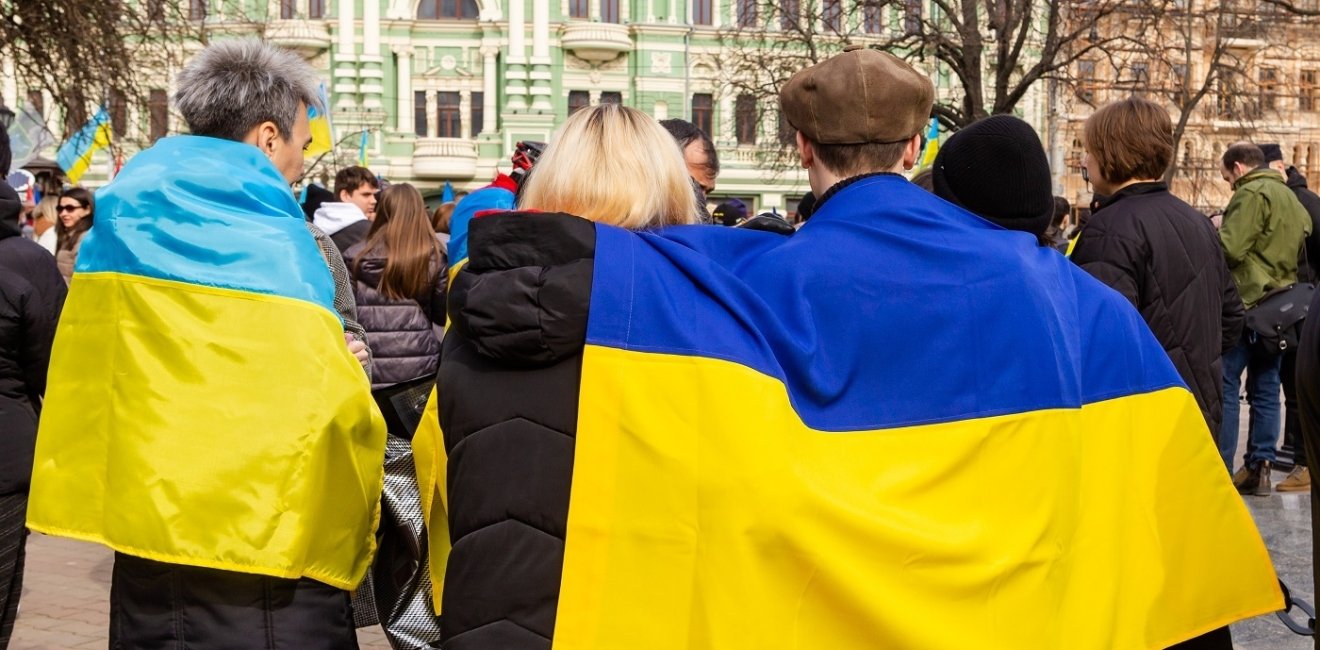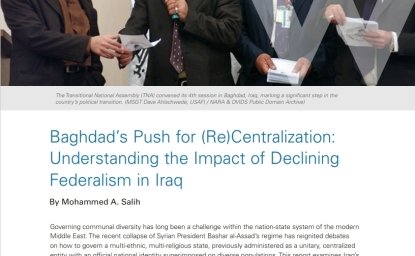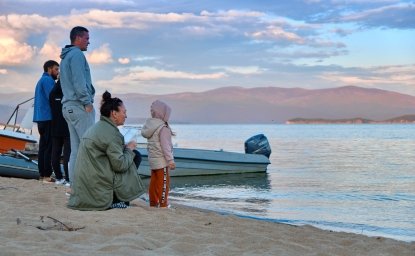Since the Russian invasion of Ukraine began in February 2022, the United States has demonstrated a strong commitment to supporting Ukraine. Understanding attitudes in wartime Ukraine is in the broad public interest and contributes to informed debate on the war and policy responses to it within the United States and beyond. This blog draws on surveys conducted in July 2022 and April 2023 to explore how Ukrainians living in front-line areas see the war and Ukraine, and how their opinions have changed during the course of the war. Here we discuss the dynamics of identity and attitudes toward Russia. The next piece delves into changing perceptions of the war.
Developing a National Identity
Russia has created a Ukraine united in resistance to invasion. Putin’s denial of Ukrainian national identity and the atrocities committed by the Russian army brought Ukrainians together from the outset. The character of the wartime nation, as one might expect, is strongly anti-Russia and anti-Russian. President Volodymyr Zelensky recently signed into law two bills. The first one makes knowledge of the Ukrainian language and Ukrainian history mandatory for citizenship. The Ukrainian language is already the exclusive language of public life (even as Zelensky’s first language is Russian). The second new law bans Russian placenames in Ukraine. Articulating the wartime mood, one Zelensky adviser spoke of the need to “eradicate everything Russian” in Crimea.
Yet co-existent with these actions is the image of Ukraine as a civic, not an ethnic, nation, a perception its many international supporters celebrate. Visiting Kyiv as Russia marked Victory Day on May 9, European Commission president Ursula von der Leyen hailed Ukraine as “the beating heart of today's European values.”
Explaining this puzzle, one Ukrainian sociologist has argued that Ukrainians increasingly fill their civic identity with more exclusivist ethnic content.
Our research on Ukrainians living at the front, the great majority of whom are Russian speakers, in July 2022 affirmed the popularity of a civic rather than an ethnic conception of the Ukrainian nation. A resurvey of 500 from this group (305 internally displaced persons, 195 local residents) in April 2023 reinforces this, with some marked changes. Here is what this distinctive group of Ukrainians think about national identity after fourteen months of war.
Ukrainians living in front-line areas see their nation as civic and multilingual.
We asked Ukrainians what it means to be a good citizen of Ukraine. Only 47 percent of our respondents agreed that this meant speaking Ukrainian only (26 percent were neutral, while 24 percent disagreed).
In 2015 Ukraine passed a series of decommunization laws against Soviet monuments and memory in Ukraine. In our survey, 49 percent agreed that rejecting Soviet history meant being a good citizen of Ukraine. A quarter were on the fence, while 24 percent disagreed with this attitude. When we asked whether being a good citizen of Ukraine meant respecting the different cultures and ethnicities of citizens, 92 percent of respondents agreed with this statement, with fewer than 1 percent disagreeing. Similarly, 96 percent of respondents agreed that being a good citizen of Ukraine meant loyalty to Ukraine independent of ethnicity, language, and culture.
In our April 2023 survey, respondents expressed a civil identity that was multilingual and inclusive of the cultural spaces of all citizens. The strongest support for a civic meaning of national identity came from IDPs in Dnipro and Zaporizhzhia and local residents of Dnipro and Poltava.
Ukrainians living at the front feel closer to Europe.
The majority of respondents (67 percent) identified as European, with 17 percent not identifying as such. This marks a shift toward this identity as 56 percent identified as European in our July 2022 survey. However, the identification with Russian culture and language (not the Russian state) remains stable, with 14 percent seeing themselves as connected in April 2023 and 17 percent in July 2022. In both surveys, the highest percentage of respondents who identified with Russian culture and language was found among IDPs and residents of Dnipro.
Ukrainians living at the front distinguish between Russian citizens and the Russian government, but still see Russian citizens as immoral.
Our respondents had strong negative feelings toward the Russian leadership. Assessing their emotions on a ten-point scale, with 10 indicating “absolutely true,” 77 percent of Ukrainians living in front-line areas marked 10 for their feeling of hatred and 79 percent marked 10 for anger. This is a slight decline from the results of our survey conducted in July 2022, when 82 percent indicated the highest mark for hatred and 83 percent for anger. However, the feeling of fear had increased: while only 35 percent expressed strong fear in July 2022, the April 2023 survey showed that strong fear was felt by 47 percent of respondents.
The survey demonstrated that respondents clearly distinguished between the Russian leadership and the Russian people. Strong feelings toward the Russian people were expressed by only one-third of respondents: hatred by 32 percent, anger by 39 percent, and fear by 26 percent of respondents. Similar to emotions felt toward the Russian leadership, the feelings of hate and anger toward Russian citizens slightly decreased (from 38 percent for hate and 43 percent for anger) but significantly increased for the feeling of fear (12 percent in July 2022 vs. 26 percent in April 2023). This tendency might be partly explained by the increased belief that the Russian people are immoral in their support for the war. Assessing the statement that Ukrainians are better people than Russians, 71 percent of respondents agreed with it in April 2023, in comparison to 61 percent in July 2022.
Conclusion
Wartime surveys have limitations. What our research suggests is that most Ukrainian citizens feel strong pride in their national identity and are unified in opposition to the invasion. Ukrainians living in front-line areas tend to be supportive of a citizenship built from plural, not singular, ethnic content. Over the course of the war they have increasingly identified with Europe and distanced themselves from Russia.
These results suggest that Ukraine risks alienating some of its own citizens by adopting an “eradicate everything Russian” attitude. An inclusive civil national identity will be vital for postwar reconstruction. A comparative analysis of fifteen peace processes by one of us (Korostelina) revealed that those that institute a civic national identity sustain peace and prosperity, whereas proposals that emphasize ethnic identity lead to further violence. Support for various minorities and freedom of identity expression cement the strength of a nation, while the imposition of one culture, one language, or one history destabilizes national development.
That Ukrainians living in front-line areas distinguish between the Russian government and Russian citizens bodes well for the possibility of a future reconciliation between the two nations when the current Russian regime changes. Reconciliation between Germany and France led to the stability of postwar Europe after 1945. Similarly, a future reconciliation between the people of Ukraine and the people of Russia, while far off, would lay a foundation for the prevention of future outbreaks of violence and limit support for war among ordinary people in the region.
Right now, protracted warfare is the reality, and with this comes an understandable desire for revenge and a seeming purifying separation. Creating a liberal, inclusive national identity in these circumstances is difficult but it can open a path to sustainable peace. Our next blog will describe the opinions of people most affected by the war.
The opinions expressed in this article are those solely of the author and do not reflect the views of the Kennan Institute.
This research was supported by National Science Foundation award number 2226741.
Authors

Professor and Director, Program on History, Memory, and Conflict, Carter School for Peace and Conflict Resolution, George Mason University


Kennan Institute
After more than 50 years as a vital part of the Wilson Center legacy, the Kennan Institute has become an independent think tank. You can find the current website for the Kennan Institute at kennaninstitute.org. Please look for future announcements about partnership activities between the Wilson Center and the Kennan Institute at Wilson Center Press Room. The Kennan Institute is the premier US center for advanced research on Eurasia and the oldest and largest regional program at the Woodrow Wilson International Center for Scholars. The Kennan Institute is committed to improving American understanding of Russia, Ukraine, Central Asia, the South Caucasus, and the surrounding region through research and exchange. Read more







